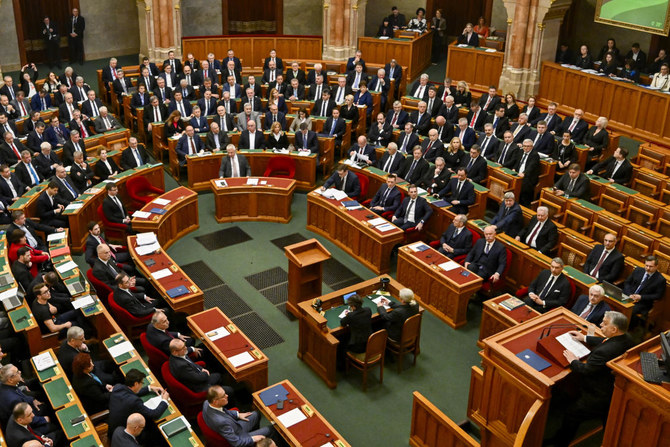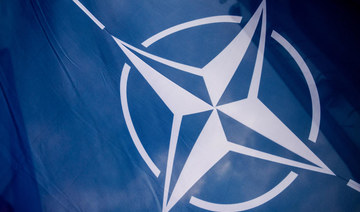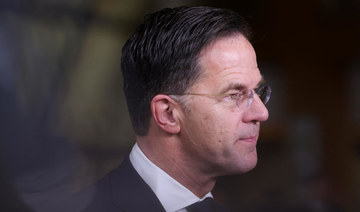BUDAPEST: Hungary’s parliament voted Monday to ratify Sweden’s bid to join NATO, bringing an end to more than 18 months of delays that have frustrated the alliance as it seeks to expand in response to Russia’s war in Ukraine.
The vote, which passed with 188 votes for and six against, came as a culmination of months of wrangling by Hungary’s allies to convince its nationalist government to lift its block on Sweden’s membership. The government of Prime Minister Viktor Orbán submitted the protocols for approving Sweden’s entry into NATO in July 2022, but the matter had stalled in parliament over opposition by governing party lawmakers.
Unanimous support among all NATO members is required to admit new countries, and Hungary is the last of the alliance’s 31 members to give its backing since Turkiye ratified the request last month.
Orbán, a right-wing populist who has forged close ties with Russia, has said that criticism of Hungary’s democracy by Swedish politicians had soured relations between the two countries and led to reluctance among lawmakers in his Fidesz party.
But the vote on Monday removed the final membership hurdle for Sweden which, along with neighboring Finland, first applied to join the alliance in May 2022.
Addressing lawmakers before the vote, Orbán said: “Sweden and Hungary’s military cooperation and Sweden’s NATO accession strengthen Hungary’s security.”
Orbán criticized Hungary’s European Union and NATO allies for placing increased pressure on his government in recent months to move forward on bringing Sweden into the alliance.
“Several people tried to intervene from the outside in the settling of our disputes (with Sweden), but this did not help but rather hampered the issue,” Orbán said. “Hungary is a sovereign country, it does not tolerate being dictated by others, whether it be the content of its decisions or their timing.”
Last weekend, a bipartisan group of US senators visited Hungary and announced it would submit a joint resolution to Congress condemning Hungary’s alleged democratic backsliding and urging Orbán’s government to immediately lift its block on Sweden’s trans-Atlantic integration.
But on Friday, Ulf Kristersson, Sweden’s prime minister, met with Orbán in Hungary’s capital where they appeared to reach a decisive reconciliation after months of diplomatic tensions.
Following their meeting, the leaders announced the conclusion of a defense industry agreement that will include Hungary’s purchase of four Swedish-made JAS 39 Gripen jets and the extension of a service contract for its existing Gripen fleet.
Orbán said the additional fighter jets “will significantly increase our military capabilities and further strengthen our role abroad” and will improve Hungary’s ability to participate in joint NATO operations.
“To be a member of NATO together with another country means we are ready to die for each other,” Orbán said. “A deal on defense and military capacities helps to reconstruct the trust between the two countries.”
Monday’s vote on Sweden’s NATO accession was just one matter on a busy agenda for lawmakers in the Hungarian parliament. A vote was also held on accepting the resignation of President Katalin Novák, who stepped down earlier this month in a scandal over her decision to pardon to a man convicted of covering up a string of child sexual abuses.
After accepting Novák’s resignation, lawmakers are expected to confirm Tamás Sulyok, the president of Hungary’s Constitutional Court, as the country’s new president. He is set to formally take office on March 5.
Some opposition parties have said they will not participate in a vote to confirm a new president and have called for direct presidential elections. But Sulyok was nominated by Orbán’s Fidesz party, which has a two-thirds majority in parliament and is expected to easily approve his presidency.
A presidential signature is needed to formally endorse the approval of Sweden’s NATO bid, which is expected within the next few days.
Hungary’s parliament ratifies Sweden’s NATO accession, clearing the final obstacle to membership
https://arab.news/cx2zn
Hungary’s parliament ratifies Sweden’s NATO accession, clearing the final obstacle to membership

- Hungary is the last of the alliance’s 31 members to give its backing since Turkiye ratified the request last month
- Vote on Monday removed final membership hurdle for Sweden which first applied to join alliance in May 2022
Parts of northern India scorched by extreme heat with New Delhi on high alert

- India’s weather department expects heat wave conditions to persist across north for next few days
- On Friday, parts of New Delhi reported up to 47.1°C, with temperatures also soaring in nearby states
NEW DELHI: Parts of northwest India sweltered under scorching temperatures on Saturday, with the capital New Delhi under a severe weather alert as extreme temperatures strike parts of the country.
India’s weather department expects heat wave conditions to persist across the north for the next few days, and has put several states on high alert.
On Friday, parts of New Delhi reported up to 47.1 degrees Celsius (116 degrees Fahrenheit). The nearby states of Punjab, Haryana and Rajasthan also saw temperatures soar and are likely to stay high over the next few days, said Soma Sen Roy, a scientist at the India Meteorological Department.
Roy cautioned people against going outdoors under the afternoon sun, drink lots of water and wear loose-fitting clothes while those who are especially vulnerable like the elderly should stay indoors.
The extreme temperatures in northern India coincide with a 6-week-long general election, with experts worried that the heat wave could increase health risks as people wait in long lines to cast their vote or candidates campaign aggressively in the outdoors. One minister fainted due to heat last month while addressing an election rally in Maharashtra state.
Prime Minister Narendra Modi as well as his main challenger, Rahul Gandhi of the opposition Congress Party, are expected to hold rallies in New Delhi later on Saturday, as the city heads to the polls on May 25.
Satish Kumar, a 57-year-old rickshaw driver in the capital, said his work was suffering because of the heat. “People are not coming outside, (markets) are nearly empty,” he said.
Pravin Kamath, a 28-year-old who runs a cart selling cold drinks, complained that it was so hot he could hardly stand being outdoors. “But I must work. What can I do? I am poor so I have to do it.”
The main summer months — April, May and June — are always hot in most parts of India before monsoon rains bring cooler temperatures. But the heat has become more intense in the past decade and is usually accompanied by severe water shortages, with tens of millions of India’s 1.4 billion people lacking running water.
A study by World Weather Attribution, an academic group that examines the source of extreme heat, found that a searing heat wave in April that struck parts of Asia was made at least 45 times more likely in some parts of the continent by climate change.
Climate experts say extreme heat in South Asia during the pre-monsoon season is becoming more frequent and the study found that extreme temperatures are now about 0.85 C (1.5 F) hotter in the region because of climate change.
At least 28 heat-related deaths were reported in Bangladesh, as well as five in India in April. Surges in heat deaths have also been reported in Thailand and the Philippines this year, according to the study.
Extreme heat is fast becoming a public health crisis in India, with more than 150 people dying last year during heat waves. The government estimates nearly 11,000 people have died during heat waves this century, yet experts say such figures are likely a vast undercount.
Slovak PM Fico stable but in serious condition

- Robert Fico underwent a two-hour operation on Friday that increased hopes for his recovery
- Slovak police have charged a man identified by prosecutors as Juraj C. with attempted murder
BANSKA BYSTRICA, Slovakia: The condition of Slovak Prime Minister Robert Fico has stabilized but remains serious, the country’s health minister said on Saturday, following Wednesday’s assassination attempt against the central European leader.
Slovakia’s deputy prime minister also said the transfer of Fico to the capital Bratislava from the small-town hospital near the area where he was shot five times at point blank range would not take place in the coming days.
There was no need to formally take over Fico’s official duties and some communication with the premier was taking place, Deputy Prime Minister Robert Kalinak told reporters in front of the hospital where Fico was being treated.
Fico underwent a two-hour operation on Friday that increased hopes for his recovery. The attack sent shockwaves throughout Europe and raised concerns over the polarized and febrile political situation in the nation of 5.4 million people.
Slovak police have charged a man identified by prosecutors as Juraj C. with attempted murder. Local news media say he is a 71-year-old former security guard at a shopping mall and the author of three collections of poetry.
Arab-American leaders meet with Blinken over Gaza

- Demands include immediate ceasefire, Israeli withdrawal, unimpeded humanitarian aid, halt to arms deliveries
- Arab American Institute president: US efforts to restrain Israel ‘feeble,’ image across Arab world ‘tattered’
CHICAGO: A group of Arab-American leaders met with Secretary of State Antony Blinken in Washington D.C. on Friday night, demanding that the US “stop the genocide” in Gaza and define a clear path to “Palestinian liberation.”
The group was led by Arab American Institute President James Zogby and included several key organizations such as the American Federation of Ramallah, the Arab American Chamber of Commerce, Arab America, and the US Palestinian Council.
In a statement sent to Arab News, organizers said they demanded that the Biden administration endorse an “immediate ceasefire” in Gaza; call for the “return of all hostages,” including Israelis taken on Oct. 7 and Palestinians being held without judicial process; support the complete withdrawal of Israeli forces from Gaza; ensure “unimpeded” humanitarian assistance to its civilian population; and cease weapons deliveries to Israel.
Israel has received more than $40 billion in aid from the Biden administration.
“When we met with Secretary Blinken in October of 2023, I noted that Israel’s indiscriminate bombing of Gaza had killed 5,000 Palestinians. I urged an immediate ceasefire to save lives. I also noted that Israel and the US were operating under the mistaken belief that the war could be won, with the likely outcome being the emergence of Hamas 2.0,” Zogby said.
“We come back seven months later with over 36,000 dead, most of Gaza’s homes and infrastructure destroyed, millions of Palestinian lives shattered, and Gaza on the verge of starvation.”
After the meeting, Zogby called US efforts to urge Israeli restraint “feeble,” adding: “Once again, we are calling on the Biden administration to demand an immediate ceasefire to end the unfolding genocide, to save Palestinian lives, and salvage whatever remains of the United States’ tattered image across the Arab world.”
Arab and Muslim leaders who met with US President Joe Biden last month in Washington D.C. left disappointed by his failure to enforce a ceasefire.
Several attendees walked out in disgust, including Dr. Thaer Ahmad, who told reporters after the April 2 meeting that he was leaving “out of respect for my community.”
After Friday’s meeting, USPC President John Dabeet said attendees “asked Secretary Blinken and the administration to subject any military assistance to Israel to strict oversight to ensure that it is fully compliant with US law, international law and human rights conventions.”
Bilal Hammoud, director of the AACC, said the Biden administration “has failed to act urgently and within its values to take meaningful measures that ensure the freedom, equality and prosperity of the Palestinian people, resulting in the loss of tens of thousands of innocent lives.
“There must be a full stop of US military funding that is threatening the security and stability of the whole region, including the cessation of attacks on sovereign Arab nations.”
Three Spanish, three Afghans killed in shooting in Afghanistan

- The group were fired on while walking through a market in the mountainous city of Bamiyan
- Among eight others wounded, four were foreigners from Norway, Australia, Lithuania and Spain
KABUL: The bodies of three Spanish tourists and three Afghans shot dead while on a tour in Afghanistan were transported to the capital along with multiple wounded, the Taliban government said Saturday.
The group were fired on while walking through a market in the mountainous city of Bamiyan in central Afghanistan, around 180 kilometers (100 miles) from the capital Kabul, on Friday evening.
“All dead bodies have been shifted to Kabul and are in the forensic department and the wounded are also in Kabul. Both dead and wounded include women,” the government’s interior ministry spokesman Abdul Mateen Qani told AFP.
“Among the eight wounded, of whom four are foreigners, only one elderly foreign woman is not in a very stable situation.”
Qani said the death toll had risen to six, including two Afghan civilians and one Taliban member.
Spain’s foreign ministry on Friday announced that three of the dead were Spanish tourists, adding that at least one other Spanish national was wounded.
According to preliminary information provided by hospital sources, the wounded were from Norway, Australia, Lithuania and Spain.
“They were roaming in the bazaar when they were attacked,” Qani added.
“Seven suspects have been arrested of which one is wounded, the investigation is still going on and the Islamic Emirate is seriously looking into the matter.”
He did not say if there had been multiple shooters.
Spanish Prime Minister Pedro Sanchez posted on X, formerly Twitter: “Overwhelmed by the news of the murder of Spanish tourists in Afghanistan.”
The European Union condemned the attack “in the strongest terms.”
“Our thoughts are with the families and loved ones of the victims who lost their lives and those injured in the attack,” the bloc said in a statement.
The Taliban government, which took power in 2021 after a decade-long insurgency against foreign forces, has yet to be officially recognized by any government.
It has, however, supported a fledgling tourism sector, with more than 5,000 foreign tourists visiting Afghanistan in 2023, according to official figures.
Tourists holiday without consular support, after most embassies were evacuated, and many Western nations advise against all travel to the country, warning of kidnap and attack risks.
Alongside security concerns, the country has limited road infrastructure and a dilapidated health service.
Bamiyan is Afghanistan’s top tourist destination, known for turquoise lakes and striking mountains, and once home to the giant Buddha statues that were blown up by the Taliban in 2001 during their previous rule.
The number of bombings and suicide attacks in Afghanistan has reduced dramatically since the Taliban authorities took power and deadly attacks on foreigners are rare.
However, a number of armed groups, including the Daesh group, remain a threat.
The jihadist group has waged a campaign of attacks on foreign interests in a bid to weaken the Taliban government, targeting Pakistan and Russian embassies as well as Chinese businessmen.
Austria to resume aid to UN agency for Palestinians

- Many countries, including Germany, Sweden, Canada and Japan, had resumed funding
- A total of 3.4 million euros ($3.7 million) in funds have been budgeted for 2024
VIENNA: Austria said Saturday it will restore its funding to the UN agency for Palestinian refugees after suspending it over allegations that staff were involved in the October 7 Hamas attacks.
Israel alleged in January that some United Nations Relief and Works Agency (UNRWA) employees may have participated in the Hamas attacks on October 7 that triggered the war in the Gaza Strip.
In the weeks that followed, numerous donor states, including Austria, suspended or paused some $450 million in funding.
Many, including Germany, Sweden, Canada and Japan, had since resumed funding, while others have continued to hold out.
“After analizing the action plan in detail” submitted by UNRWA “to improve the functioning of the organization,” Austria has decided to “release the funds,” its foreign ministry said in a statement.
A total of 3.4 million euros ($3.7 million) in funds have been budgeted for 2024, and the first payment is expected to be made in the summer, the statement said.
“Some of the Austrian funds will be used in the future to improve internal control mechanisms at UNRWA,” it added.
Austria said it will “closely monitor” the implementation of the action plan with other international partners, noting that “a lot of trust had been squandered.”
The Alpine country said it has substantially increased support for the suffering Palestinian population in Gaza and the region since 7 October, making 32 million euros ($34.8 million) in humanitarian aid available to other international aid organizations.
The Hamas attack on October 7 resulted in the death of more than 1,170 people in Israel, most of them civilians, according to an AFP tally based on official Israeli figures.
Israel’s campaign in Gaza has since killed at least 35,303 people, also mostly civilians, according to data provided by the health ministry in the Hamas-run territory.


















